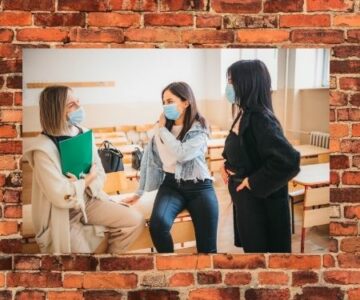Perspectives is an opportunity for Fellows and others to share their ideas in short, accessible essays. IPE/BC Fellows hold a range of views and interests relative to public education.
Beyond Education as Usual: Public Education in a Post-COVID World
A report on the IPE/BC Fellows Forum by Moira Mackenzie
COVID-19 is a mirror, and the flaws in many of our institutions are being reflected back to us. The pandemic has created the most significant disruption in education we may have ever seen, revealing much as this virus has taken over our lives. What has happened that is worth keeping, what is worth exploring and what has failed?
This is the challenge put to the panel addressing the annual Fellows Forum on February 27th. Rising to the occasion were panelists: Julia MacRae, an experienced teacher with a Masters in Curriculum Studies and 1st Vice-President of the Surrey Teachers’ Association; Jamie Smallboy/Nohtikwew pisim, a Langara student in Aboriginal studies, dedicated advocate, Cree mother of five and survivor of residential schools and the 60s Scoop; and Bryn Williams, veteran teacher and administrator, currently a principal in Coquitlam and Executive Director of BC Association for Supervision and Curriculum Development.
Julia, Jamie, and Bryn were all clear that a return to “normal,” as it was pre-pandemic, was neither possible nor advisable. COVID-19 has compelled us to refocus.
 Looking back to last March, Bryn recalled worrying about whether the resilience of students, teachers and parents could sustain itself for the long road ahead. However, even with very difficult challenges, shared leadership and strength have grown, with everyone working together in support of students, families, and the community. “This embodies what public education is all about- that it’s for the common good,” said Bryn. His hope is that distributed leadership with connections to community continues to flourish, post COVID-19.
Looking back to last March, Bryn recalled worrying about whether the resilience of students, teachers and parents could sustain itself for the long road ahead. However, even with very difficult challenges, shared leadership and strength have grown, with everyone working together in support of students, families, and the community. “This embodies what public education is all about- that it’s for the common good,” said Bryn. His hope is that distributed leadership with connections to community continues to flourish, post COVID-19.
Jamie lauded the care that teachers at her children’s school take to connect with students, knowing that family circumstances vary greatly. “What’s amazing is that my children are nurtured body, mind and spirit; it doesn’t matter what’s going on in their external environment, their school is welcoming,” she said. Contrasting this with her own deeply traumatic residential day school and public school experiences, Jamie strongly advised all schools to uphold this commitment. Bryn agreed, speaking to the value of focusing on the whole child and of trauma-informed classrooms where students can count on understanding, empathy, and wrap-around support.
Correspondingly, Jamie called for the public funds spent on private schools to be redirected to supports that are necessary for children’s well-being but not currently available in public schools. “I’ve seen so many children shut down before they even begin because they’re overwhelmed with everything they don’t have and everything they’re expected to accomplish in competition with children who have always had opportunity, privilege and a stable home.”
For Julia, it is paramount to consider the injustices laid bare by this pandemic. Many students are dealing racism and inequity in their communities and grief, fear, tragedy, worry, and job loss in their families. In turn, teachers have been creating deeply meaningful lessons and making space for discussion of these real-life issues, reinforcing the important role of public schools in social justice.
Will there be a lasting impact on teaching, learning and the curriculum? Again, the panelists advised against simply going back to the way things were.
 Jamie urged recognition of the Indigenous world view in schools, noting that Indigenous people are keepers of knowledge fundamental to the creation of a compassionate, harmonious society and to the planet’s very survival. She highlighted the need to recruit more Indigenous teachers and welcome Indigenous elders into classrooms, and expressed her concern that an over-emphasis on academics means that children are missing many of the basic life skills needed to survive and live in harmony with others. “We’re teaching kids to be scholars; we’re not teaching them to be community members,” she said.
Jamie urged recognition of the Indigenous world view in schools, noting that Indigenous people are keepers of knowledge fundamental to the creation of a compassionate, harmonious society and to the planet’s very survival. She highlighted the need to recruit more Indigenous teachers and welcome Indigenous elders into classrooms, and expressed her concern that an over-emphasis on academics means that children are missing many of the basic life skills needed to survive and live in harmony with others. “We’re teaching kids to be scholars; we’re not teaching them to be community members,” she said.
Julia noted that teachers have definitely been advancing the new curriculum in these times. The professional decision-making, choice and innovation required by the current circumstances are aligned with the tenets of this curriculum. Teachers have been creating, curating, and sharing excellent teaching resources, exercising their judgement both of necessity and in deep commitment to their students.
What about the heavy reliance on technology?
Bryn drew attention to the huge divide within communities when it comes to equipment and access. There are many ways to use the technology to enhance in-person learning and meetings, attend to engagement, and provide flexibility, but equity must be addressed.
 “Every teacher sees the difficulty in it now and every parent sees the limitations,” said Julia. She noted that attendance at virtual meetings and workshops is high, but there is a passivity that comes with engaging online. “There is something about the physicality that leads to memorable professional development experiences and enhances the way we learn and make decisions together,” Julia observed.
“Every teacher sees the difficulty in it now and every parent sees the limitations,” said Julia. She noted that attendance at virtual meetings and workshops is high, but there is a passivity that comes with engaging online. “There is something about the physicality that leads to memorable professional development experiences and enhances the way we learn and make decisions together,” Julia observed.
Sharing a warning, Jamie said, “During the pandemic, I’ve seen how much time teachers spend with our children. They are a huge part of their lives. I’ve also seen how desensitized our children are becoming because of technology. These children will grow up with Google as their moral compass. If society continues to accept technology over humanity, we’re in serious trouble.” She concluded, ” There seems to be less humanity within the walls of the rooms where decisions are being made for children, and that is discouraging fact”.
Many more perspectives were shared; the time flew by and the value of the dialogue was clear. Now, the challenge for all of us is to continue the discussion.
The central role of education, and especially public education, in the economic, social and political life of British Columbia is more obvious than ever and understood more fully by the general public. The pandemic has shone a bright harsh light on so many vulnerabilities and exacerbated already unacceptable inequalities. While no one would have wished for this societal trauma, we want to consider how to capitalize on the centrality and essential role public education plays by thinking big to envision change in these unprecedented times.
Moira Mackenzie is a member of the IPE Board of Directors, former BCTF Executive Director, and retired elementary school teacher.